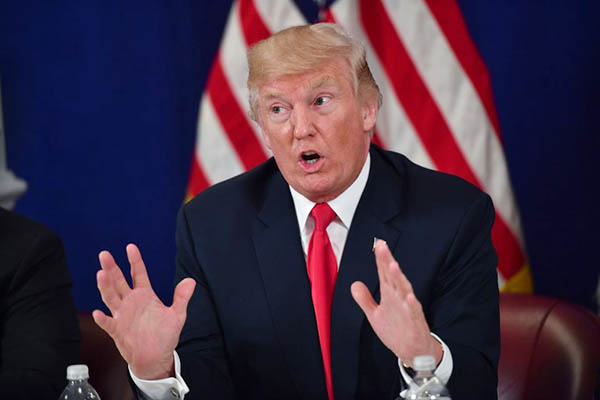
Nicholas Kamm—AFP
A look at the U.S. government body Trump is relying on for foreign investment oversight
President Donald Trump backed away Wednesday from using emergency powers to restrict Chinese investment in the United States, choosing instead to rely on beefed up authority for a 43-year-old government body. But what is the secretive Committee on Foreign Investment in the United States (CFIUS), the interagency body that monitors access to key sectors of the U.S. economy?
What is it?
CFIUS is led by the Treasury Department, and comprises officials from the departments of Commerce, Defense, State and Homeland Security and others who wield great power over proposed foreign investments in areas deemed vital to national security.
President Gerald Ford created CFIUS in 1975, a time when lawmakers were increasingly alarmed at the rising investments in the United States by oil producing countries amid skyrocketing crude prices. Companies facing acquisition by foreign entities are required to notify CFIUS, which reviews the proposed transaction and may launch an investigation to consider possible national security implications.
How does it operate?
Officials pay special attention to the possible transfer of sensitive technology to sanctioned countries as well as changes in control of critical infrastructure, telecommunications and healthcare. This process can last up to 75 days. If CFIUS determines a proposed transaction poses national security dangers that cannot be resolved, it refers the matter to the president, who may suspend the deal or block it outright.
In 2016, there were 172 transactions referred to CFIUS for review, and 79 investigations were launched, with a single negative decision from the president, according to Treasury data, the latest year for which complete data is available. Prior to that the last presidential ruling was in 2012.
Frequently companies will simply withdraw their offers of investment in the face of a CFIUS review, as happened 27 times in 2016. But some companies will resubmit a modified proposal in an effort to address the committee’s concerns.
Proposed reform
Rather than impose specific restrictions on Chinese investment, Trump said Wednesday he would await a reform by Congress of CFIUS and export controls and use those expanded tools to address “concerns regarding state-directed investment in critical technologies.”
The House and Senate each have passed versions of the CFIUS reform which experts say have taken into consideration many of the concerns expressed by the U.S. business sector. That includes limiting the focus to national security issues rather than a broader test of economic security or industrial policy, and steering clear of scrutiny of outbound U.S. investments and joint ventures.
However, the two versions must be reconciled before Trump can sign the measure into law, and experts are concerned the process could prove contentious.
Notable cases
President Donald Trump in March notably blocked Singapore-based Broadcom from acquiring California chipmaker Qualcomm, citing national security concerns to thwart what had promised to be the biggest tech deal in history.
Former President Barack Obama in 2012 blocked the Chinese-owned Ralls Corp from acquiring Oregon wind farms deemed too close to a U.S. military installation. And in one of the most high-profile cases involving China, state oil firm CNOOC in 2005 dropped a bid to acquire American firm Unocal after CFIUS failed to investigate the deal, amid opposition from U.S. lawmakers.
CFIUS’s work frequently has reflected the anxieties of the era.
In the 1980s, CFIUS turned to sensitive investments from a resurgent Japan. A Japanese company in 1983 withdrew its offer to acquire an American specialty steel producer whose product was classified by the Defense Department, which opposed the deal. Another Japanese firm in 1985 had to allow production of specialized ball bearings to remain in the United States to win approval for its takeover of the manufacturer.
Amendments have since expanded the U.S. president’s authority to block mergers, acquisitions and takeovers. Following the attacks of September 11, 2001 on New York and Washington, lawmakers became especially concerned about investments possibly tied to terrorism.
Lawmakers were outraged in 2006 after CFIUS declined to investigate after reviewing the takeover of six U.S. ports by the Emirati firm Dubai World Ports, which ultimately sold them to an American owner in the face of heated public scrutiny.
Is it unique?
While the U.S. process receives a lot of attention, many countries conduct similar reviews of foreign investments. This month, expanded powers took effect in Britain allowing the government to scrutinize foreign investments that raise questions of national security.
In France, the Bureau Multicom 2, a part of the Ministry of Economy, reviews foreign investments on a similar basis, as do 11 other E.U. member states.
National security investment reviews are also conducted by authorities in Canada, Australia and China where the National Security Law took effect in 2015, creating an oversight function to review the national security implications of foreign investments.
